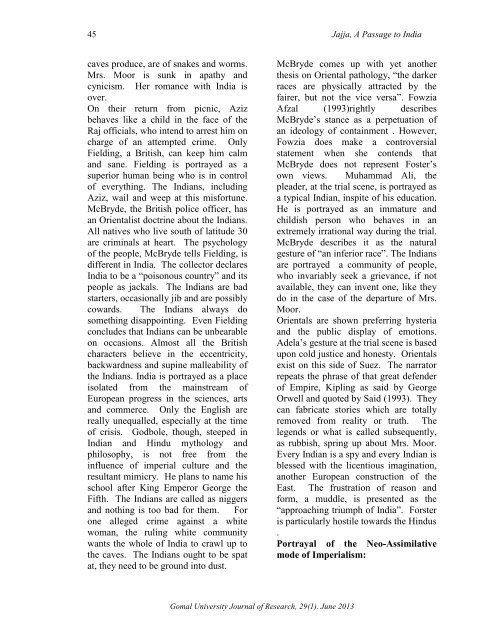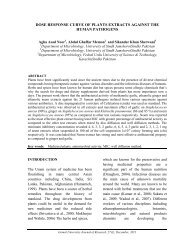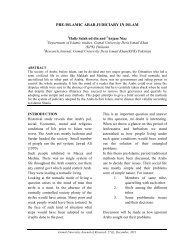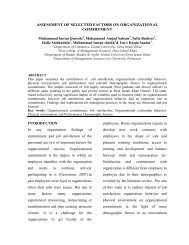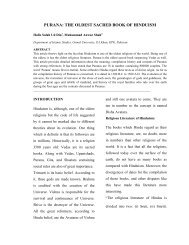a passage to india: the colonial discourse and ... - Gomal University
a passage to india: the colonial discourse and ... - Gomal University
a passage to india: the colonial discourse and ... - Gomal University
Create successful ePaper yourself
Turn your PDF publications into a flip-book with our unique Google optimized e-Paper software.
45 Jajja, A Passage <strong>to</strong> India<br />
caves produce, are of snakes <strong>and</strong> worms.<br />
Mrs. Moor is sunk in apathy <strong>and</strong><br />
cynicism. Her romance with India is<br />
over.<br />
On <strong>the</strong>ir return from picnic, Aziz<br />
behaves like a child in <strong>the</strong> face of <strong>the</strong><br />
Raj officials, who intend <strong>to</strong> arrest him on<br />
charge of an attempted crime. Only<br />
Fielding, a British, can keep him calm<br />
<strong>and</strong> sane. Fielding is portrayed as a<br />
superior human being who is in control<br />
of everything. The Indians, including<br />
Aziz, wail <strong>and</strong> weep at this misfortune.<br />
McBryde, <strong>the</strong> British police officer, has<br />
an Orientalist doctrine about <strong>the</strong> Indians.<br />
All natives who live south of latitude 30<br />
are criminals at heart. The psychology<br />
of <strong>the</strong> people, McBryde tells Fielding, is<br />
different in India. The collec<strong>to</strong>r declares<br />
India <strong>to</strong> be a “poisonous country” <strong>and</strong> its<br />
people as jackals. The Indians are bad<br />
starters, occasionally jib <strong>and</strong> are possibly<br />
cowards. The Indians always do<br />
something disappointing. Even Fielding<br />
concludes that Indians can be unbearable<br />
on occasions. Almost all <strong>the</strong> British<br />
characters believe in <strong>the</strong> eccentricity,<br />
backwardness <strong>and</strong> supine malleability of<br />
<strong>the</strong> Indians. India is portrayed as a place<br />
isolated from <strong>the</strong> mainstream of<br />
European progress in <strong>the</strong> sciences, arts<br />
<strong>and</strong> commerce. Only <strong>the</strong> English are<br />
really unequalled, especially at <strong>the</strong> time<br />
of crisis. Godbole, though, steeped in<br />
Indian <strong>and</strong> Hindu mythology <strong>and</strong><br />
philosophy, is not free from <strong>the</strong><br />
influence of imperial culture <strong>and</strong> <strong>the</strong><br />
resultant mimicry. He plans <strong>to</strong> name his<br />
school after King Emperor George <strong>the</strong><br />
Fifth. The Indians are called as niggers<br />
<strong>and</strong> nothing is <strong>to</strong>o bad for <strong>the</strong>m. For<br />
one alleged crime against a white<br />
woman, <strong>the</strong> ruling white community<br />
wants <strong>the</strong> whole of India <strong>to</strong> crawl up <strong>to</strong><br />
<strong>the</strong> caves. The Indians ought <strong>to</strong> be spat<br />
at, <strong>the</strong>y need <strong>to</strong> be ground in<strong>to</strong> dust.<br />
McBryde comes up with yet ano<strong>the</strong>r<br />
<strong>the</strong>sis on Oriental pathology, “<strong>the</strong> darker<br />
races are physically attracted by <strong>the</strong><br />
fairer, but not <strong>the</strong> vice versa”. Fowzia<br />
Afzal (1993)rightly describes<br />
McBryde’s stance as a perpetuation of<br />
an ideology of containment . However,<br />
Fowzia does make a controversial<br />
statement when she contends that<br />
McBryde does not represent Foster’s<br />
own views. Muhammad Ali, <strong>the</strong><br />
pleader, at <strong>the</strong> trial scene, is portrayed as<br />
a typical Indian, inspite of his education.<br />
He is portrayed as an immature <strong>and</strong><br />
childish person who behaves in an<br />
extremely irrational way during <strong>the</strong> trial.<br />
McBryde describes it as <strong>the</strong> natural<br />
gesture of “an inferior race”. The Indians<br />
are portrayed a community of people,<br />
who invariably seek a grievance, if not<br />
available, <strong>the</strong>y can invent one, like <strong>the</strong>y<br />
do in <strong>the</strong> case of <strong>the</strong> departure of Mrs.<br />
Moor.<br />
Orientals are shown preferring hysteria<br />
<strong>and</strong> <strong>the</strong> public display of emotions.<br />
Adela’s gesture at <strong>the</strong> trial scene is based<br />
upon cold justice <strong>and</strong> honesty. Orientals<br />
exist on this side of Suez. The narra<strong>to</strong>r<br />
repeats <strong>the</strong> phrase of that great defender<br />
of Empire, Kipling as said by George<br />
Orwell <strong>and</strong> quoted by Said (1993). They<br />
can fabricate s<strong>to</strong>ries which are <strong>to</strong>tally<br />
removed from reality or truth. The<br />
legends or what is called subsequently,<br />
as rubbish, spring up about Mrs. Moor.<br />
Every Indian is a spy <strong>and</strong> every Indian is<br />
blessed with <strong>the</strong> licentious imagination,<br />
ano<strong>the</strong>r European construction of <strong>the</strong><br />
East. The frustration of reason <strong>and</strong><br />
form, a muddle, is presented as <strong>the</strong><br />
“approaching triumph of India”. Forster<br />
is particularly hostile <strong>to</strong>wards <strong>the</strong> Hindus<br />
.<br />
Portrayal of <strong>the</strong> Neo-Assimilative<br />
mode of Imperialism:<br />
<strong>Gomal</strong> <strong>University</strong> Journal of Research, 29(1). June 2013


